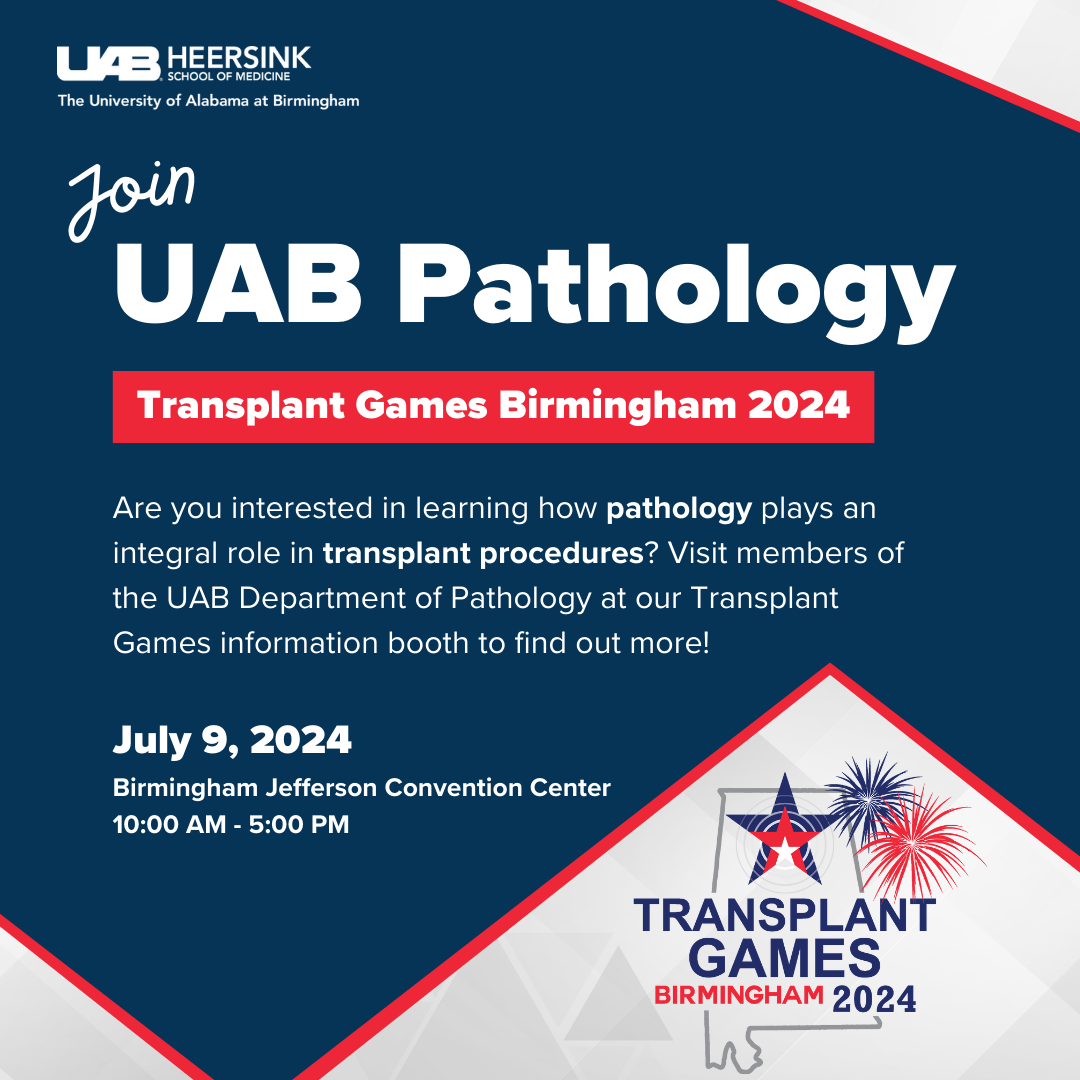
Transplantation is a complicated and delicate process that begins long before organs are surgically placed into the recipient. The doctors of UAB Pathology play a crucial role in that process, providing details of pathological findings in diagnostic biopsies throughout the transplant process.
Several members of the UAB Pathology clinical faculty will take part in the 2024 Transplant Games of America, a biennial event welcoming thousands of individuals involved with transplants and organ donation. During the event, which takes place July 5-10 at a variety of locations throughout the Greater Birmingham area, transplant recipients and living donor athletes compete in 20 athletic and recreational competitions.
UAB Pathology faculty and staff look forward to the opportunity to meet individuals impacted by transplantation, and to showcase the behind-the-scenes work they do in support of these procedures. UAB Pathology will have representatives at the UAB Medicine booth, in the Birmingham-Jefferson Convention Complex (BJCC), July 9 from 10am to 5pm. UAB Medicine is the presenting medical partner for the games, and UAB’s Sports and Exercise Medicine team will provide medical coverage for all athletes at the games.
“We are excited to have this chance to bring our specialty before this unique audience, to engage with them on their experiences and explain how pathologists work to ensure the safety and success of transplants,” says Cristina Magi-Galluzzi, M.D., Ph.D., C. Bruce Alexander Endowed Professor and Chair, UAB Pathology. “Our pathologists specialize in individual organ systems, and as such have the capacity to help determine whether a transplant will be successful, via biopsy and other diagnostic testing.”
UAB Pathologists involved include the pre- and post-transplantation biopsy and diagnostic testing for renal transplants, led by Huma Fatima, M.D., Associate Professor and Renal Section Head; uterine transplants, led by Andrea Kahn, M.D., Professor and GYN Section Head; liver transplants with Deepti Dhall, M.D., Professor and GI Section Head; lung transplants, Thomas Winokur, M.D., Professor and Pulmonary Section Head; and heart transplants, Silvio Litovsky, M.D., Professor and Cardiovascular Section Head.

“The transplantation of donor organs into patients with end-stage organ disease is a life-saving procedure,” says Litovsky, who has worked in cardiovascular pathology at UAB for two decades. He explains the process as follows:
“In the standard of care for organ transplantation, both donors and recipients undergo a pre-transplant assessment of blood type, histocompatibility, pathology and clinical case histories. When a match pair is found, the organ transplantation will proceed and then subsequently be monitored. Post-transplant monitoring includes electronic medical record (EMR) review, blood and fluid assessment of organ function and formation of donor-specific antibodies, and protocol biopsies that depend on the transplanted organ.”
Transplanted organs may develop pathology that results in transplanted organ dysfunction following the transplant, Litovsky explains. The pathology may include rejection (acute or chronic), infection, and recurrence of the original disease that prompted the transplant, medication toxicity, malignancy or newly developed disease.
“A biopsy of the transplanted organ provides valuable information regarding the underlying pathology and helps the clinician with management decisions,” Litovsky says.
Another way UAB Pathology is involved in transplant is through UAB’s Tissue Biorepository (UAB-TBR), led by Director Sameer Al Diffalha, M.D., Associate Professor of Anatomic Pathology, which provides approval to process the tissue samples for detection of antibody or cellular rejection. This step is fundamental in evaluating the success of the transplant process.
“A well-established institutional biorepository is crucial for future discoveries and advancement of medicine efforts that help patients live a longer, healthier life,” says Dr. Al Diffalha.
UAB Hospital was among the first hospitals in U.S. to perform a uterine transplant, a relatively new procedure, and in June 2023, UAB’s first uterine transplant recipient gave birth to a healthy baby. The role of pathologists in this type of transplant is key, as monitoring the organ itself is a challenge, says Kahn.
“With kidneys, we can monitor their function by serology, however in uterine transplant, there is no biochemical test so we use protocol biopsies to check whether the patient is rejecting the organ,” she says.
Kahn, Dhall, and the entire UAB Pathology Women’s Health team have since participated in working with teams at other institutions to develop guidelines for uterine transplant that could eventually be adopted worldwide.
In what may be the next phase of innovation in transplantation medicine, UAB pathologists and support staff were involved with the groundbreaking transplant of genetically modified clinical grade pig kidneys into a brain-dead human individual at UAB in 2022, replacing the recipient’s native kidneys.
Fatima was the clinician responsible for providing diagnoses and assessing for graft rejection, on multiple biopsies taken over the course of several days that the kidney was in the donor’s body.
“Every biopsy came to our lab and was studied the same way as human biopsies to see what changes were taking place,” Fatima says.
According to an article by UAB News, UAB is consistently recognized as one of America’s top transplant centers, based on the hospital’s history of innovation and achievement in organ transplantation. To date, more than 16,000 organ transplants have been performed at UAB, including heart, lung, combined heart/lung, liver, kidney, pancreas, and uterus procedures. Read more about some of our patient stories here. UAB has been able to lead in this lifesaving space thanks to Legacy of Hope, Alabama’s federally regulated organ and tissue procurement organization. You can register to be a donor here.
Visit UAB Pathology at the UAB Medicine booth in the BJCC during the Transplant Games on Tuesday, July 9, from 10 a.m. to 5 p.m.